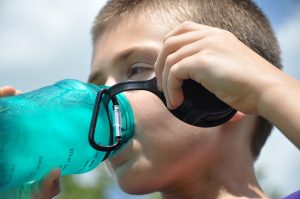09 Jan What Does Your Child Drink?

Did you know that one in three Americans drinks at least one sweetened drink every day? More and more children are drinking juice, soda, and sport drinks as part of their regular diet. These beverages are not only loaded with sugar but they are leading to obesity, poor nutrition, and tooth decay.
So what is the best way to quench your child’s thirst? WATER, WATER, WATER!
Water makes up more than half your child’s body weight. A person cannot survive more than a few days without adequate amounts of water. Water is found in your blood and is part of your immune system, and water is used to digest your food and to help eliminate your pee and poop.
Any fluid your child drinks will contain water, but unlike juice, soda, and sport drinks, water does not contain sugar.
When your body does not have enough water, it becomes dehydrated. Even mild dehydration in children leads to headaches, crankiness, poor concentration, tiredness, and poor performance. Parents often do not recognize that their child is dehydrated until these signs appear.
How Much Water Does Your Child Need?
The amount of water a child needs depends on their age, their size, their activity level, and the outside temperature. A quick and simple rule to follow is to take your child’s weight and divide that number in half. That is approximately how many ounces of water your child needs a day. For example, a 50-pound child requires roughly 25 ounces of water a day (or just over three glasses of water), and a 100-pound child requires 50 ounces of water (or just over six glasses of water a day). Remember, if your child is participating in sports or playing outside on a hot day, then the water consumption needs to be higher. Taking breaks every 15–20 minutes to drink water is very important to keep your child’s body hydrated.
How Do I Get My Child to Drink Water?
Start with yourself. Children copy their parents. Let your child see you drink water throughout the day and with meals.
- Make sure your child always has a water bottle available
- Add a slice of lemon or lime to give the water a different taste
- Add herbs such as mint to flavor the water
- Use frozen fruit as ice cubes in glasses of water
Also, stop buying sugary beverages. Start a “Sugary Beverage Coin Jar” and place the money you would spend on juice, soda, and sport drinks into the jar. Use the money at the end of the week or month to do something fun as a family.
If you would like more information about gastrointestinal (GI) digestive disorders and nutrition in children, please contact Dr. Mona Dave’s Frisco Office or Request Appointment Here.